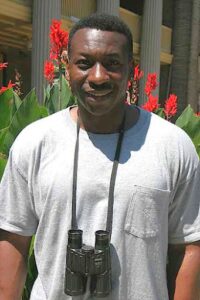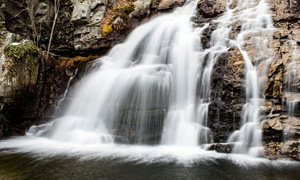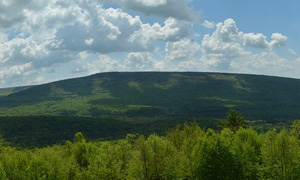
Currently serving as the Program Manager of Audubon for the Mid-Atlantic region in Philadelphia located at the Discovery Center, ornithologist, and naturalist Keith Russell has studied birds since he was in the third grade. Growing up in Philadelphia, bird watching was not a popular topic, but Keith was hooked. Along with watching birds, he frequented the library to borrow books on birds and he drew pictures of birds. His parents encouraged his interest in birds by buying him a set of binoculars. Keith’s passion was further inspired by his bird-watching neighbor, Joseph Cadbury, who took him on bird-watching trips.
In high school, Keith began working summers at the Academy of Natural Sciences in Philadelphia under the mentorship of renowned ornithologist Dr. Frank Gill. At the Academy, Keith exposure to museum collections inspired him to pursue a career focused on working in museums. He graduated with a bachelor’s degree in biology, going on to pursue a Master of Science in Zoology with a focus on Museum Studies.
Over the next decade, Keith worked as the collections manager in the Exhibits Department at the Academy of Natural Sciences of Drexel University. From 1992 to 2003, Keith acted as Assistant Editor for the prestigious publication The Birds of North America. As time went by, Keith became more and more concerned about the dead birds he saw on the sidewalks of Philadelphia, the result of collisions with windows and buildings. He felt a profound call to action to prevent migratory birds from dying due to urban perils.
Keith, not an out going person when he was younger, came out of his shell at Audubon, frequently interacting with the public to make a difference. With Audubon Pennsylvania, now known as Audubon Mid-Atlantic since 2003, Keith has become a champion of urban conservation as well as a key figure in documenting environmental impact and educating a diverse community to conserve and utilize the natural spaces that exist in urban areas like Philadelphia.
Key Figure in The Discovery Center
In his quest to conserve natural resources and in his passion for protecting migratory birds, Keith. as well as other scientists, naturalists, and conservationists, have been documenting environmental impacts on natural spaces through data collection for decades. One such location that Keith worked diligently to save was the East Park Reservoir in Philadelphia near the Strawberry Mansion community. The reservoir, built in 1889 to be a major supply of water for Philadelphia and a recreational area for residents, was decommissioned in the 1970s. Increasingly isolated from the community, by the early 2000s, the Philadelphia Water Department made plans to drain the reservoir, which had become a hub for a diverse array of wildlife and an important stopover location for birds migrating along the Atlantic Flyway.
Keith and other researchers were able to present the Philadelphia Water Department with important ecological data that halted the draining of the reservoir. In its seclusion, the reservoir had gained ecological significance, but the time had come to open access to these lands to the community once more. In 2006, planning to create the Discovery Center began, opening in 2018, along the East Park Reservoir. It is now the headquarters for Audubon Mid-Atlantic and the Philadelphia Outward Bound School, a collaboration born out of both organizations prioritizing accessibility to nature and its resources and meeting the challenges and obstacles that interfere with public access to nature, including the birds that occupy and migrate through those spaces.
According to The Discovery Center Website, “The Discovery Center provides a public space for neighbors, Philadelphia Outward Bound School, and Audubon Mid-Atlantic to come together and co-create opportunities for Philadelphians to discover themselves in nature, practice leadership, and work toward a greener city for birds and people.”
Keith believes important advances to the environmental conservation movement can occur through a communal appreciation for birds. Birds are attractive to most people. “Birds innately give pleasure,” says Russell and this causes people to come to appreciate environmental issues affecting birds just like Keith Russell does.
Native Plants Initiative
As the Program Manager for Urban Conservation of Audubon Mid-Atlantic, Keith works in Pennsylvania and Maryland, especially in the management of plants and promotion of native plants at the Discovery Center and beyond. Though grant funding had been previously secured to determine the best utilization of the grounds at the Discovery Center, Keith says sometimes it comes down to doing the best they can. Going forward there is a further initiative to come up with more concise plans for plant management such as utilizing goats and limiting the use of harmful herbicides.
Drawing a Younger Generation to Conservation
How do we get younger generations involved in the conservation movement? Keith believes there is a disconnect with younger folks, who may not be experiencing nature due to fear of, misinformation, and lack of knowledge and antagonistic. Keith believes that through birding programs like those hosted by Audubon at the Discovery Center, this younger generation can observe and learn the importance of protecting natural resources. As for the modern-day pessimism toward climate change and environmental degradation, Keith reiterates that younger conservationists need to understand even through all the assaults that have occurred on nature, that conservationists of the past made a difference, and we can make a difference too.
Sustainability through Longevity
According to Keith, longevity is the key to sustaining the work of environmental protection and conservation. Intentional planning is essential to facing issues whether they be financing a project or adjusting to ever-present twists and turns. Keith emphasizes that sustainability and longevity are important to never giving up. He pointed to the 2020 mass collision of birds during migration that happened in Philadelphia, a catastrophic event that incited the creation of Bird Safe Philly where multiple organizations, including regional Audubon chapters, came together with limited funding. Through mostly volunteer work they have made strides to protect migratory birds passing through Philadelphia.

Enhancing Diversity through Birding
Diversity has become a much bigger point of discussion in the conservation community and in recent years there has been a focus on ending discrimination and the lack of access of marginalized communities. An issue that does not get a lot of attention according to Keith is that of “culture.” People follow the customs of their culture and that creates a hard barrier to navigate. From 2020 to 2022, as COVID-19 upended lives on a global level, many black people and people of color gained a renewed interest in going outside into parks. From this, an interest in birding cultivated a deeper appreciation for conservation. Changes to promote diversity in the conservation community are happening with the creation of groups like Outdoor Afro.
Keith believes we can further this progress by intentionally welcoming others and giving them examples of people like them in the conservation community. Highlighting stories of people such as Black naturalists and birders, like Audubon Mid-Atlantic did in 2022 to 2023 on their website, can make previously marginalized people want to participate. Even the process of collecting ecological data and sharing the information can be compelling to the public and make them engaged. Bringing value to land is vital to conservation.
Takeaways For Conservation of Our Lands
Working to protect migratory birds and conserve environmental spaces for over two decades, Keith Russell has several important insights!
- Be persistent!
- Create coalitions. There is strength in numbers! Even two or three people count!
- Make sure you are integrating different skill sets. No one person has all the answers!
- Collect data! It will help you back up arguments and get further.
- Don’t give up! Be aware of overwhelming problems that occurred in the past and find a solution. Don’t get overwrought or discouraged.
Everyone has the potential to make a difference! It has become easier for people to have influence so “Create a Firestorm!”
If you have stories of diversity in conservation or want us to highlight a certain conservationist or naturalist in Pennsylvania with unique perspectives, email [email protected]
Further Online Resources about Keith Russell, the Audubon Society, and the Discovery Center:
- How to Get to the Discovery Center and Philly’s Idyllic Hidden Reservoir
- For migrating birds, the Philly skyline can be deadly
- Bird Safe Philly.
- How Bird Safe Philly is Making the City Safer for Migrating Birds | Audubon
- The Discovery Center
- The Academy of Natural Sciences of Drexel University
- Keith Russell | Audubon Pennsylvania
- Keith Russell | Delaware Valley Ornithological Club
- Check out the PPFF Facebook page and see an interview with Keith Russell from September 12, 2020: https://www.facebook.com/share/p/LHhZm85LVNrkzM6x/?mibextid=oEMz7o
- I am Audubon: Keith Russell: https://www.facebook.com/watch/?v=10155625077479007
- Spark Interview with Keith Russell on February 1, 2024: https://www.facebook.com/share/v/dJfJfdiJhPdR61cU/?mibextid=jmPrMh
Written by Martha Moon, PPFF Conservation Heritage Project Intern




